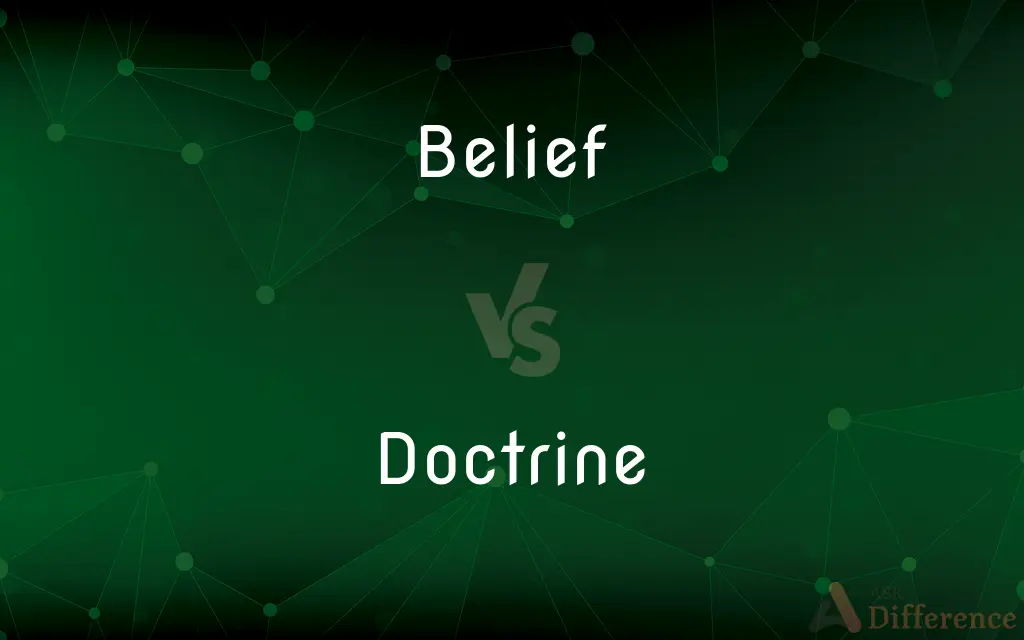Belief vs. Doctrine — What's the Difference?
By Tayyaba Rehman & Maham Liaqat — Updated on March 11, 2024
Belief is personal or collective acceptance without proof, while doctrine is an official system of principles or tenets.

Difference Between Belief and Doctrine
Table of Contents
ADVERTISEMENT
Key Differences
Belief is a personal or collective conviction held by individuals or groups, often based on faith, trust, or confidence in something or someone, without needing empirical evidence. Whereas, doctrine refers to a set of beliefs, teachings, or instructions, often formalized and disseminated by an authoritative body, such as a religious, political, or educational institution, aiming to guide behavior and thought.
Beliefs are generally subjective and can vary greatly among individuals, even within the same community or group. They can be shaped by personal experiences, culture, and upbringing. On the other hand, doctrines are more structured and uniform, intended to ensure consistency and uniformity of thought and practice among the members of the institution that promotes them.
Beliefs can evolve and change over time as individuals gain new experiences and insights. This fluidity allows for personal growth and the adaptation of one’s perspective to new circumstances. In contrast, doctrines are often more rigid, changing slowly over time, usually through formal revisions by the authoritative body that established them.
Beliefs do not necessarily need to be validated by others to be held by an individual. They are often deeply personal and can be kept private. Conversely, doctrines require a level of public acknowledgment and acceptance, especially within the communities or institutions they are meant to serve.
Beliefs can encompass a wide range of convictions, including those about the existence of a higher power, ethical and moral values, or personal goals and aspirations. Doctrines, however, are typically more focused on specific ideological or theological principles and are used to establish a collective identity or to promote a particular way of life.
ADVERTISEMENT
Comparison Chart
Definition
A personal or collective conviction without need for proof.
A formal system of principles set by an authority.
Source
Personal experience, culture, upbringing.
Religious, political, educational institutions.
Flexibility
Subjective and can change over time.
More rigid and changes formally.
Validation
Personal, does not need public acknowledgment.
Requires public acknowledgment within its community.
Scope
Wide range, including personal ethics and goals.
Focused on specific ideological or theological principles.
Compare with Definitions
Belief
Conviction of the truth of some statement or the reality of some being or phenomenon.
Her belief in kindness shapes her actions.
Doctrine
A principle or body of principles presented for acceptance or belief by a governing body.
The doctrine of non-violence guides their actions.
Belief
Acceptance of a fact or a principle.
The belief in freedom of speech is fundamental to democracy.
Doctrine
A stated principle of government policy, mainly in foreign or military affairs.
The Monroe Doctrine shaped early American foreign policy.
Belief
Personal or shared convictions not based on empirical evidence.
Their belief in an afterlife comforts them.
Doctrine
An official policy or position of a political party, government, or institution.
The party's doctrine focuses on social equality.
Belief
A psychological state in which an individual holds a proposition or premise to be true.
His belief in extraterrestrial life drives his research.
Doctrine
A belief or set of beliefs held and taught by a church, political party, or other group.
The doctrine of the Trinity is central to many Christian denominations.
Belief
A feeling of certainty about the truth of something.
Her belief that she can win the race motivates her training.
Doctrine
The body of teachings of a religious, philosophical, or ideological group.
Buddhist doctrines promote peace and understanding.
Belief
A belief is an attitude that something is the case, or that some proposition about the world is true. In epistemology, philosophers use the term "belief" to refer to attitudes about the world which can be either true or false.
Doctrine
Doctrine (from Latin: doctrina, meaning "teaching, instruction") is a codification of beliefs or a body of teachings or instructions, taught principles or positions, as the essence of teachings in a given branch of knowledge or in a belief system. The etymological Greek analogue is "catechism".Often the word doctrine specifically suggests a body of religious principles as promulgated by a church.
Belief
The mental act, condition, or habit of placing trust or confidence in another
My belief in you is as strong as ever.
Doctrine
A principle or body of principles presented for acceptance or belief, as by a religious, political, scientific, or philosophic group; dogma.
Belief
Mental acceptance of and conviction in the truth, actuality, or validity of something
His explanation of what happened defies belief.
Doctrine
A rule or principle of law, especially when established by precedent.
Belief
Something believed or accepted as true, especially a particular tenet or a body of tenets accepted by a group of persons.
Doctrine
A statement of official government policy, especially in foreign affairs and military strategy.
Belief
Mental acceptance of a claim as true.
It's my belief that the thief is somebody known to us.
Doctrine
(Archaic) Something taught; a teaching.
Belief
Faith or trust in the reality of something; often based upon one's own reasoning, trust in a claim, desire of actuality, and/or evidence considered.
My belief is that there is a bear in the woods. Bill said he saw one.
Based on this data, it is our belief that X does not occur.
Doctrine
(countable) A belief or tenet, especially about philosophical or theological matters.
The incarnation is a basic doctrine of classical Christianity.
The four noble truths summarise the main doctrines of Buddhism.
Belief
(countable) Something believed.
The ancient people have a belief in many deities.
Doctrine
The body of teachings of an ideology, most often a religion, or of an ideological or religious leader, organization, group, or text.
What is the understanding of marriage and family in orthodox Marxist doctrine?
Belief
(uncountable) The quality or state of believing.
My belief that it will rain tomorrow is strong.
Doctrine
(countable) A self-imposed policy governing some aspect of a country's foreign relations, especially regarding what sort of behavior it will or will not tolerate from other countries.
Belief
(uncountable) Religious faith.
She often said it was her belief that carried her through the hard times.
Doctrine
Teaching; instruction.
He taught them many things by parables, and said unto them in his doctrine, Hearken.
Belief
(in the plural) One's religious or moral convictions.
I can't do that. It's against my beliefs.
Doctrine
That which is taught; what is held, put forth as true, and supported by a teacher, a school, or a sect; a principle or position, or the body of principles, in any branch of knowledge; any tenet or dogma; a principle of faith; as, the doctrine of atoms; the doctrine of chances.
Articles of faith and doctrine.
Unpracticed he to fawn or seek for powerBy doctrines fashioned to the varying hour.
Belief
Assent to a proposition or affirmation, or the acceptance of a fact, opinion, or assertion as real or true, without immediate personal knowledge; reliance upon word or testimony; partial or full assurance without positive knowledge or absolute certainty; persuasion; conviction; confidence; as, belief of a witness; the belief of our senses.
Belief admits of all degrees, from the slightest suspicion to the fullest assurance.
Doctrine
A belief (or system of beliefs) accepted as authoritative by some group or school
Belief
A persuasion of the truths of religion; faith.
No man can attain [to] belief by the bare contemplation of heaven and earth.
Belief
The thing believed; the object of belief.
Superstitious prophecies are not only the belief of fools, but the talk sometimes of wise men.
Belief
A tenet, or the body of tenets, held by the advocates of any class of views; doctrine; creed.
In the heat of persecution to which Christian belief was subject upon its first promulgation.
Belief
Any cognitive content held as true
Belief
A vague idea in which some confidence is placed;
His impression of her was favorable
What are your feelings about the crisis?
It strengthened my belief in his sincerity
I had a feeling that she was lying
Common Curiosities
Can beliefs change over time?
Yes, beliefs can evolve with new experiences and insights, unlike doctrines which change more formally.
Do doctrines require public acceptance?
Yes, doctrines typically seek public acknowledgment, especially within specific communities or institutions.
What is a doctrine?
A doctrine is a formal system of principles or teachings established by an authoritative body.
How do beliefs and doctrines differ in source?
Beliefs stem from personal experiences, culture, or upbringing, whereas doctrines are issued by institutions like churches or governments.
Are beliefs always religious?
No, beliefs can be about any aspect of life, including personal ethics and goals, not just religious convictions.
Is it necessary to follow a doctrine to be part of a community?
Often, yes, especially in religious or ideological communities, adherence to doctrine can be important for membership.
Can someone disagree with a doctrine and still be part of the community?
This depends on the community; some may allow for differing views, while others may require strict adherence.
What is a belief?
A belief is a personal or shared conviction held without the need for empirical evidence.
Are all doctrines religious?
No, doctrines can also be political, educational, or related to any organized body of thought.
How do personal beliefs influence behavior?
Personal beliefs can deeply influence an individual's choices, actions, and perspective on life.
Can a doctrine be a belief?
Yes, a doctrine can be a belief, especially if an individual personally accepts the teachings of a particular doctrine.
How are beliefs formed?
Beliefs are formed through personal experience, cultural influences, education, and upbringing.
What role do doctrines play in society?
Doctrines can guide the behavior, beliefs, and practices of a community, establishing a common identity and values.
Can beliefs be proven?
Beliefs often do not require proof and are held based on faith, trust, or confidence.
What happens when doctrines change?
When doctrines change, it can lead to shifts in community practices, beliefs, and sometimes division or reform within the group.
Share Your Discovery

Previous Comparison
Quitting vs. Quitted
Next Comparison
Equipment vs. ApplianceAuthor Spotlight
Written by
Tayyaba RehmanTayyaba Rehman is a distinguished writer, currently serving as a primary contributor to askdifference.com. As a researcher in semantics and etymology, Tayyaba's passion for the complexity of languages and their distinctions has found a perfect home on the platform. Tayyaba delves into the intricacies of language, distinguishing between commonly confused words and phrases, thereby providing clarity for readers worldwide.
Co-written by
Maham Liaqat














































